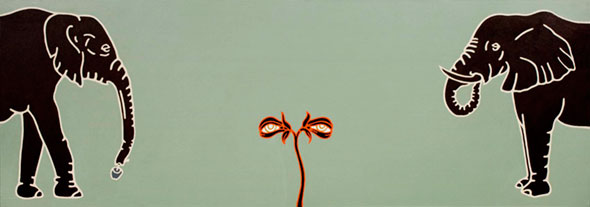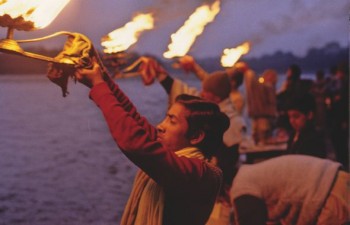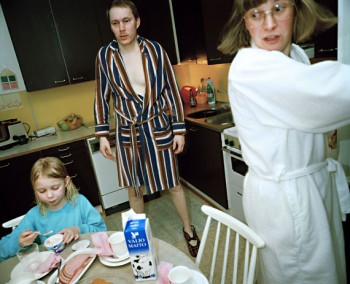Search results for "2010/02/2011/04/2009/09/what-god-said"
Three short stories
30 June 1987 | Archives online, Fiction, Prose
from Väärinkäsityksiä (‘Misconceptions’). Interview by Markku Huotari
Love
Kaija couldn’t understand why she felt like laughing all the time.
‘As for me, what I stand for is good old-fashioned courtesy,’ he pointed out.
He’d got a soft, low, caressing voice. He rested his hand on Kaija’s shoulder. They’d got that far already. Kaija had decided to say yes, even though he hadn’t suggested anything yet. She was beginning to picture luxurious rooms, gourmet dishes, expensive drinks, and tender, passionate lovemaking.
‘Socially I’m a radical,’ he said. ‘Culturally a liberal, but in personal things an unshakeable conservative. A woman, in my view, is to be respected – I don’t consider that damaging to her independence. Too often, in today’s world, equality’s used to justify what are quite simply bad manners.’ More…
In the beginning was… DNA?
8 October 2010 | Reviews

Adam and Eve, or the elephants: Osmo Rauhala’s sketch of The Fall of Man. As the bull eats the apple, evil rises from the ground in the form of a plant with eyes: a ‘misbreed’, a cross of two species alien to each other
Kuutti Lavonen – Osmo Rauhala – Pirjo Silveri
Tyrvään Pyhän Olavin kirkko – sata ja yksi kuvaa /
St Olaf’s Church in Tyrvää – One Hundred and One Paintings
Toim. / Edited by Pirjo Silveri
Translations: Silja Kudel, Jüri Kokkonen
Helsinki: Kirjapaja, 2010. 143 p., ill.
ISBN 978-952-247-103-1
€44.30, hardback
The old shingle roof of the early 16th-century stone church of St Olaf in Tyrvää, in the province of Pirkanmaa, southern Finland, was repaired by village volunteers in 1997. Three weeks after they completed their work, a drunken arsonist set the church on fire. More…
Incident at Experience Farm
30 September 1998 | Archives online, Fiction, Prose
A short story from Pakkasyön odottaja (‘Waiting for a frosty night’, WSOY, 1997). Introduction by Jukka Petäjä
I
The round steel teapot is new. Father brought it back from Birmingham, where he went on a visit with the others from the concrete factory. In the shop, the teapot was wrapped in rustling, soft tissue paper. Pirjo was given the honour of opening the package. The pot has been used for brewing tea ever since.
At school, her sister Karoliina is proud of the fact that at home they drink only tea; they are different from other people, different in a good way, one to be proud of. They have a real teapot. Sometimes, during breaktime, a morsel of the excellence of Karoliina Kamppinen falls Pirjo’s way. ‘Yes, let’s include her, she’s Karoliina’s sister, after all.’ More…
New literary prize
6 May 2011 | In the news
A new literary prize was founded in 2010 by an association bearing the name of Jarkko Laine (1947–2006) – poet, writer, playwright, translator, long-time editor of the literary journal Parnasso and chair of the Finnish Writers’s Union.
The Jarkko Laine Literary Prize will be awarded to a ‘challenging new literary work’ published during the previous two years. The jury, of nine members, will announce the winner on 19 May.
The shortlist for the first prize is made of Kristina Carlson’s novel Herra Darwinin puutarhuri (‘Mr Darwin’s gardener’, Otava, 2009), Juha Kulmala’s collection of poems, Emme ole dodo (‘We are not dodo’, Savukeidas, 2009) and Erik Wahlström’s novel Flugtämjaren (‘Fly tamer’, Finnish translation Kärpäsenkesyttäjä, Schildts, 2010).
The prize money, €10,000, comes jointly from the publishing houses Otava, Otavamedia and WSOY, the Haavikko Foundation, the City of Turku and the University of Turku.
The Onlookers
30 September 1978 | Archives online, Fiction, Prose
A short story from Naisten vuonna (‘In women’s year’, 1975). Introduction by Pekka Tarkka
The two elks came out on to the road through a gap between timber sheds. They began to cross the road, and the larger one was very nearly run into by a car. Cars stopped and horns tooted, till the elks turned and made off towards the harbour. Several cars swung round and drove along the cinder track in pursuit of the animals.
The elks headed across the rubble towards the power station; after circling some stacks of railway sleepers, they ended up on the flank of a coalheap sixty feet high. The cars pulled up and their occupants poured out, shouting that the elks wouldn’t go that way, it was a dead end. The elder of the two elks had indeed sensed this, and they moved off to the right, skirting the coal-heap and emerging among the timber-stacks. By this time the first cyclists and pedestrians had arrived on the scene.
“They’ll break their legs,” said a pedestrian to a motorist. “There’s all kinds of junk lying about.” More…
Time difference
30 December 2003 | Fiction, Prose
A short story from Kalliisti ostetut päivät (Dearly bought days, Otava, 2003)
She arrived at the airport too early, as always. The reason was not that connections from the small town in which she lived were slow and difficult, or even that she liked the airport’s atmosphere of swift departures and long waits. No; she wanted to spend time at the airport to see that the planes took off and landed without anything awful happening. She wanted to see that a departing plane’s acceleration was rapid, that the plane left the asphalt of the runway elegantly, that its tail did not hit the ground as it rose, break, the plane explode, catch fire, but that, like an arrow fired into the air, following its flight path, it curved upward and, sunlight glancing off the metal of the body, disappeared from view. She wanted to see that the landing gear of a descending plane was out, as it should be, that a tyre did not burst as it hit the ground, at that there was no ice or oil on the runway; that the brakes worked, and that the fire engines at the edge of the airfield stayed in place as a sign that all was well. More…
The blow-flower boy and the heaven-fixer
31 December 1984 | Archives online, Fiction, Prose
A short story from Puhalluskukkapoika ja taivaankorjaaja (‘The blow-flower boy and the heaven-fixer’, 1983). Interview by Olavi Jama
Cold.
A chill west wind came over the blue ice. It went right to the skin through woollen clothes. Shivers ran up and down the spine, made shoulders shake.
In the bank of clouds close to the horizon, right where the icebreaker had crunched open a passage to the shore, hung a pale blotch, a substitute for the sun. It gave off more chill than warmth.
Lennu’s teeth were chattering.
He wore a buttoned-up windbreaker, a hand-me-down from Gunnar, over a heavy lambswool shirt. It couldn’t keep off the cold. More…
Melba, Mallinen and me
30 June 1993 | Archives online, Fiction, Prose
From Fallet Bruus (‘The Bruus case’, Söderströms, 1992; in Finnish, Tapaus Bruus, Otava), a collection of short stories
After the war Helsingfors began to grow in earnest.
Construction started in Mejlans [Meilahti] and Brunakärr [Ruskeasuo]. People who moved there wondered if all the stone in the country had been damaged by the bombing or if all the competent builders had been killed; if you hammered a nail into a wall you were liable to hammer it right into the back of your neighbor’s head and risk getting indicted for manslaughter.
Then the Olympic Village in Kottby [Käpylä] was built, and for a few weeks in the summer of 1952 this area of wood-frame houses became a legitimate part of the city that housed such luminaries as the long-legged hop-skip-and-jump champion Da Silva, the runner Emil Zatopek (with the heavily wobbling head), the huge heavyweight boxer Ed Saunders and the somewhat smaller heavyweight Ingemar Johansson who had to run for his life from Saunders. More…
The many arms of Krishna
14 August 2014 | Extracts, Non-fiction

A feast by the Ganges. Photo from Pirjo Honkasalo’s film Atman
Cinematographer, camerawoman and director Pirjo Honkasalo has travelled and filmed widely – Japan, Estonia, India, Chechnya, Ingushetia, Russia – and her documentary films in particular have gained fame. American film critic John Anderson interviews Honkasalo; they talk about her documentary film Atman (1996) about a pilgrimage in India.
Edited extracts from Armoton kauneus. Pirjo Honkasalon elokuvataide (‘Merciless beauty. The film art of Pirjo Honkasalo’, Siltala, 2014; translated from English into Finnish by Leena Tamminen)
You can almost catch a whiff of the Ganges watching Atman [Hindu term, ‘self’], a documentary film in which religious pilgrimage, devotion, exhilaration and hysteria compete with tormented bodies, physical mortification, corpses, pollution and the acrid smoke of ritual cremation for domination of the viewer’s senses. The fact that it won the top prize at the International Documentary Film Festival Amsterdam in 1996 proves there is, if not justice, then good taste in the world. With all due respect to her previous work, Atman signified the full manifestation of Honkasalo’s genius.
What is it about? Eternity. Also, Jamana Lal: a member of the low-caste of Baila, a wifeless, crippled devotee of Lord Shiva whose mother has died, and who must – according to Hindu tradition – take her ashes from the ostensible mouth of the Ganges to the foothills of the Himalayas. More…
Dog
30 September 2002 | Archives online, Fiction, Prose
A short story from Afrikasta on paljon kertomatta (‘Much is still untold about Africa’, WSOY, 2002). Introduction by Maria Säntti
You’re exactly what a dog should be, I told him. You’ve a black ear and a white one. You’re not too big and you’re not all teeth.
I stroked his black-spotted coat. He wagged his curly tail.
I crouched down. He squeezed up against my chest. I sent my ball rolling along the stairway corridor. He shot after it, accidentally running over the top of it. As he braked, his claws screeched on the tiles. Sparks went flying.
He snapped the ball in his jaws, nibbled its plastic and sent it back with a snuffle. His tongue was wagging with glee. Next I wanted to roll the ball so he wouldn’t get it. It bumped against the iron banister and went off in a different direction, skidding under the dog’s belly. He turned and dashed after it. More…
Here and there
11 September 2009 | Extracts, Non-fiction
Extracts and photographs from Jotain on tapahtunut /Something happened (Musta Taide, 2009; translation by Jüri Kokkonen)
 News photos document dramatic, dangerous or tragic incidents – but the photojournalist Markus Jokela is interested in documenting ordinary, domestic and everyday life, be it in Iraq, Russia, Biafra or Sri Lanka. These photographs, with commentaries, are taken from his new book, Jotain on tapahtunut / Something happened (2009), offering glimpses of life in contemporary Finland and in the United States
News photos document dramatic, dangerous or tragic incidents – but the photojournalist Markus Jokela is interested in documenting ordinary, domestic and everyday life, be it in Iraq, Russia, Biafra or Sri Lanka. These photographs, with commentaries, are taken from his new book, Jotain on tapahtunut / Something happened (2009), offering glimpses of life in contemporary Finland and in the United States
I’ve never been particularly enthusiastic about individual news photos, especially about taking them.
A good news photo has to state things bluntly and it has to be quite simple in visual terms. It must open up immediately to the viewer.
But the images in photo reportages do not have to scream simplified truths. They can whisper and ask, and open up gradually. One can come back to them. The reportage is something personal. Though a poor medium for telling about the complex facts of the world, it can provide experiences that survive. More…
Tutti frutti
20 November 2009 | In the news
 The chair of the jury for the Finlandia Prize for Non-Fiction 2009, Professor Pekka Puska, compared choosing a winner to the dilemma of choosing between oranges and bananas. The jury found that among the entries were at least 20 or 30 books that could have gone on the final shortlist of six titles. More…
The chair of the jury for the Finlandia Prize for Non-Fiction 2009, Professor Pekka Puska, compared choosing a winner to the dilemma of choosing between oranges and bananas. The jury found that among the entries were at least 20 or 30 books that could have gone on the final shortlist of six titles. More…
The dog-man’s daughter
30 December 2001 | Fiction


 Extracts from the radio play Porkkalansaari (‘The island of Porkkala’, the Finnish Broadcasting Company, 1993)
Extracts from the radio play Porkkalansaari (‘The island of Porkkala’, the Finnish Broadcasting Company, 1993)
The surface of the earth is the first to freeze; then the still waters. The sea freezes at the shore often at the same time, on the same night, as the slow-flowing brooks. I have watched them for many years. When you live in the same place for a long time, you notice this much: that almost everything just repeats and repeats.
It flows into a plastic tube. I suppose water flows inside it. You could drop matchsticks in on the other side of the road and wait on this side for them to swim through the drum. You’d only have to find one; that would be enough to prove it. More…
In the north
30 September 1988 | Archives online, Fiction, Prose
A short story from Luvaton elämä (‘Forbidden life’, 1987). Introduction by Tero Liukkonen
I
I went up north in a sleeping car. It was a relief to see that even in Tampere there was a sign on the car saying ‘Kemijärvi’. That meant I could sleep the whole way. I had the lower berth; a couple more like me were sleeping in the same compartment – just ordinary women. I was nevertheless silent and reserved, so that neither of them would want to make me into a travelling companion. And they did leave me in peace.
I read for a bit, till I began to feel more at home, and settled down to sleep with my woollen socks on. I deliberately went almost to sleep while not wanting to drop off completely; and I gradually reached a point where I didn’t know which direction the train was going in. That was liberating. It was all the same which direction we were going in. The motion of the train got through to my nerves and started releasing things. More…
